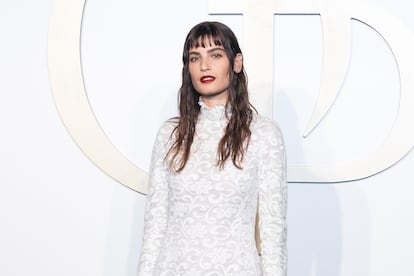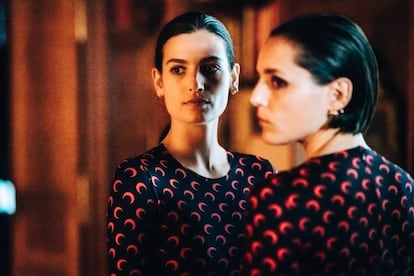Alma Jodorowsky, the actress who shuns the ‘it girl’ label to star in feminist stories
With ‘Split,’ a drama about human relationships, the French performer intends to move away from the cliché of being a style icon and focus on her film career


Although the world considered Alma Jodorowsky just another it girl — the young, slim girls, born in the artistic environment of a privileged family who become style icons — the elegant French brunette has managed to escape the cliché and focus on her acting career. The 32-year-old actress has been successfully fighting for more than a decade to keep the name of her grandfather, Chilean filmmaker Alejandro Jodorowsky, from monopolizing the interviews she gives. And until recently she preferred to stay at home watching Claire Denis films or classic cinema rather than strolling through the most exclusive parties in the French capital.
In fact, she is proud of the fact that her latest role is the opposite of an it girl. Split, the drama series in which she stars and which was presented this month at the Geneva International Film Festival after passing through the prestigious Series Mania, has given her that opportunity. In the series, she plays Anna, a woman who works on a movie set as a body double for the leading character. Despite being very different in character and being engaged to a man, she is hopelessly attracted to the actress and decides to start an unprecedented and tumultuous love affair. “Finally someone puts an introverted woman at the center of the story! People like that also exist,” Jodorowsky says to EL PAÍS during an interview in the Swiss city.
The actress admits that she is only able to be vulnerable with the people closest to her. That’s why she worked closely with series creator Iris Brey to gain the intimacy she needed. Brey, until now a film critic, has made the leap to directing with this story, which has a strong feminist accent, in which voluntary abortion and rape are discussed openly, without taboos. “These are situations that women often face, but they don’t appear on-screen. Not even something as common as menstruation exists in film and television,” Jodorowsky laments.

For the sex scenes between Split’s two leads, the series relied on an intimacy coordinator. “It’s not just about feeling comfortable shooting sex scenes or executing choreography. I also worked with her on how to express emotions with your body, something that until now was more typical of theater and that greatly enriches the work in front of the camera,” the actress says. The intimacy coordinator is an increasingly common figure in the audiovisual industry.
That wasn’t the case 10 years ago, when Jodorowsky played a supporting role in La vie d’Adèle [Blue Is the Warmest Colour in English]. Abdellatif Kechiche’s film, winner of the Palme d’Or at the Cannes Film Festival, was both lauded and criticized. Part of the audience and the specialized press felt that the director’s take on the lesbian relationship at the center of the story was too masculine. “Of course I see the problem, I see the differences of shooting a love story between two women with Abdellatif then and with Iris now. My ideas related to feminism have evolved in this time, like those of the rest of the industry. But to condemn [Blue Is the Warmest Colour] now is to decontextualize the film, which at the time was something important and revolutionary for much of the queer community. It helped a lot of women come out of the closet and find themselves represented [in a movie]. You don’t know how many of them have approached me and said: ‘Thank you for being there, it was very important in my life to see two women falling in love on screen,’” she explains.
Alma Jodorowsky collaborated several times as a model with Karl Lagerfeld’s Chanel and, early in her career, branched out to the music industry, as the image of the electro pop duo Burning Peacocks, as the face of the electro pop duo Burning Peacocks, which disbanded almost immediately. Now she’s getting back into music — occasionally, she assures. She recently collaborated with Finnish Jaakko Eino Kalevi on the song Palace In My Head, the music video of which she directed. For her, it’s another way of broadening her experience behind the camera and to pay tribute to the decade of the seventies, which Jodorowsky (born in the nineties) finds appealing. One of her latest film roles is that of a pioneering creator of electronic music in The Sound of the Future, a film set precisely in that era.
Jodorowsky admits that, in recent years, she has changed her mind somewhat when it comes to going to parties. She’s aware that attending them is crucial if you want to stay active in the industry. “It took me a while to come to terms with it being part of my job,” she assures. But she remains determined to be more than just an it girl. Has she learned anything from her grandfather’s creative drive, even though their relationship has been distant for years? “I’d rather not answer that question,” she responds gently.
Sign up for our weekly newsletter to get more English-language news coverage from EL PAÍS USA Edition
Tu suscripción se está usando en otro dispositivo
¿Quieres añadir otro usuario a tu suscripción?
Si continúas leyendo en este dispositivo, no se podrá leer en el otro.
FlechaTu suscripción se está usando en otro dispositivo y solo puedes acceder a EL PAÍS desde un dispositivo a la vez.
Si quieres compartir tu cuenta, cambia tu suscripción a la modalidad Premium, así podrás añadir otro usuario. Cada uno accederá con su propia cuenta de email, lo que os permitirá personalizar vuestra experiencia en EL PAÍS.
¿Tienes una suscripción de empresa? Accede aquí para contratar más cuentas.
En el caso de no saber quién está usando tu cuenta, te recomendamos cambiar tu contraseña aquí.
Si decides continuar compartiendo tu cuenta, este mensaje se mostrará en tu dispositivo y en el de la otra persona que está usando tu cuenta de forma indefinida, afectando a tu experiencia de lectura. Puedes consultar aquí los términos y condiciones de la suscripción digital.








































